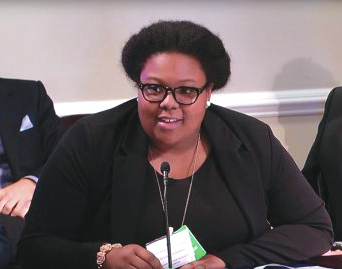
Greene County News
FAIRBORN — A Wright State University Boonshoft School of Medicine medical student spoke at the second White House Symposium on addiction, “Medicine Responds to Addiction II,” on Oct. 25.
Christen Johnson, a fourth-year medical student, spoke on behalf of medical students and underserved communities in support of addiction medicine curriculum and bias training in medical education.
The event brought together federal partners and national leaders from medical schools, residency and fellowship programs to advance addiction medicine education and training and to explore Centers of Excellence in Addiction Medicine models.
Johnson described the need for addiction medicine curriculum in medical education so that future physicians can better treat patients with addiction problems. Often, medical students are thrust into the medical setting with little training in addiction medicine. “The problem with that is a lot of physicians, especially our attending physicians, don’t necessarily have the experience in addiction medicine to be able to give us the sensitivities we need.”
When addiction is considered a health issue or a disease rather than a crime, medical students can learn about an integrated approach to substance use disorders and expand their skills so they treat addiction as future physicians, Johnson said.
Johnson also is the national president of the Student National Medical Association (SNMA), the oldest and largest medical student organization dedicated to serving the needs of underserved communities and underrepresented minority students who wish to pursue careers in the field of medicine. SNMA is taking several steps to help medical students better understand addiction medicine.
The organization is working on a plenary session for its national conference about addiction medicine. The session will focus on addiction medicine in underserved communities, biases in medical education, how medical students can unpack these biases before they become physicians and how they can assist their medical schools through curriculum research. SNMA is working on curriculum that targets bias and the ways that medical students can be taught to fully look at patients as a whole.
“If we are able to achieve these things in medical education, then we’ll have medical students who are fully able to take on this task and potentially enter these fellowships and become really socially conscious and culturally competent physicians,” Johnson said. “They will also be clinically excellent in helping us deal with this issue.”
Johnson will graduate in May 2017 with a dual M.D./M.P.H. degree. While she is busy as the national president of SNMA, she also remains active as a medical student at Wright State, where she participates in the Family Medicine Interest Group, of which she is a past copresident. She also is a member of Phi Rho Sigma, a national social and community service organization represented by Alpha Upsilon Chapter at the Boonshoft School of Medicine, the Latino Medical Student Association Artemis Medical Society and the American Medical Student Association.
She is a 2015 recipient of a scholarship from the National Health Service Corps (NHSC) Scholarship Program, which awards scholarships to students pursuing primary health care professions in return for a commitment to provide health care to communities in need. After a residency in family medicine, she plans to serve at an NHSC-approved site in a high-need health professional shortage area for a minimum of two years.
Her goal is to become an academic family physician with a special interest in adolescent health. She wants to dedicate her career to the elimination of health disparities.


